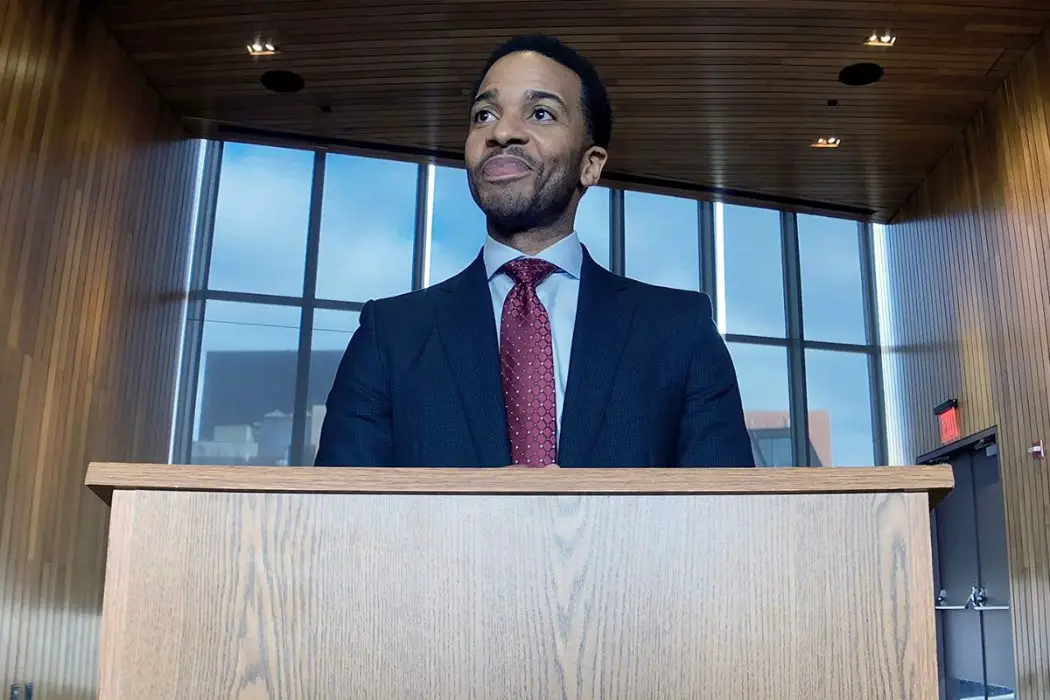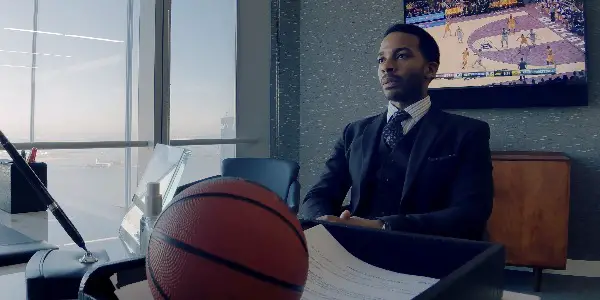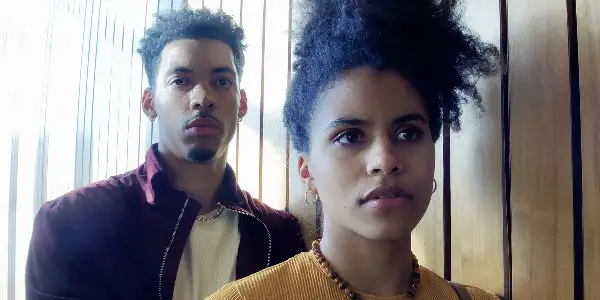HIGH FLYING BIRD: The Financial Side Of The NBA Has Never Been This Fun

Alistair is a 25 year old writer based in Cambridge.…
Film history is littered with the tantalising prospects of movies that never happened. From Tim Burton‘s take on Superman and Tarantino‘s revisionist Bond movie, to the countless unmade projects from the likes of Welles or Kubrick, being a film fan is as much about fantasising about the movies that never were as much as it is appreciating the ones we have.
Steven Soderbergh‘s take on Moneyball was forever doomed to share this fate – rather than the conventional drama we eventually got courtesy of Bennett Miller, Soderbergh was interested in experimenting with mixing together conventional dramatisations with documentary talking heads of the people being portrayed. As the film entered production, Sony Pictures got nervous and pulled the plug, with Soderbergh jumping ship, and his innovative ideas nowhere to be seen in the final product.
From Moneyball to Basketball
Moneyball went onto be a Best Picture nominee and is a perfectly serviceable affair, but is considerably low energy, especially when it has a screenplay credited to both Aaron Sorkin and Steven Zaillian. Soderbergh‘s plan for the film was to make general audiences forget they were watching a statistics heavy film by making it an exciting, frequently funny experience – Miller‘s iteration is not exactly boring, but it feels a bit of a stretch to consider it “fun”. The weight of Moneyball rests heavily on the shoulders of High Flying Bird, a film that feels like it was conceived entirely for Soderbergh to show the world what his take on that film would look like.
And in this regard, it more than lives up to expectations; it’s a charismatic, often funny film that remains entertaining even as the very specific board room machinations of the plot are likely to go over the heads of most audiences. I can’t confess to understanding the inside world of basketball, and there are certain things about High Flying Bird that have understandably led audiences (including myself) to be perplexed. Soderbergh throws you into the deep end and only gradually gives you context as the story progresses. By that time, I was so entertained, the film had managed to pull off the unusual trick of making me think I understood far more than I actually did.

High Flying Bird is set during a fictional NBA lockout, largely inspired by the 2011 lockout that lasted 161 days, when team owners attempted to get a more even split from their players’ financial profits. We are introduced to hotshot sports agent Ray Burke (André Holland), who is meeting with promising young star Erick (Melvin Gregg), who has just been signed to a major New York team, but hasn’t been paid because of the lockout. He’s made a terrible financial decision by getting a loan to cover his debts – but by the time Ray has finished lecturing Erick about this mistake, his company credit card has been declined. With both failing to keep the money rolling in due to the suspension of the game, and Ray losing employees and company finances by the time we’re introduced to him, he decides to use the unaware young star as a pawn to get the lockout over and done with. From staging social media feuds, to instigating charity matches that are against the provisions of the lockout, Ray tries to stay ahead of the game in whatever way he can, as well as attempting to shift traditional power dynamics in place at the NBA.
The story (courtesy of Moonlight screenwriter Tarell Alvin McCraney) reexamines the lockout in the context of race – specifically, how a group of largely white owners created a “game on top of the game”, raking in billions on the back of a game where the star players are predominantly African American. McCraney‘s screenplay is all too aware of how this would invite metaphors to a modern kind of slavery, and even builds its finest running joke upon it: Bill Duke‘s youth coach asking everybody to repeat the statement “I love the lord and all his black people” whenever they indulge that train of thought. It’s something of a stretch to refer to the film as an out and out satire, but it does keep both feet firmly in the socially conscious at all times.
A Stealth Heist Movie
Most notably, in a nod to his original pitch for Moneyball, we repeatedly see current NBA players appear in talking heads, speaking of the difficulty to make it as a black athlete within this system. If there is a flaw, it’s that it may address the flaws of the system, but it only ever hints at what is needed to do to change it. This culminates in the eventual revelation of the book Erick was gifted by Ray in the first scene, which doesn’t disclose any of the arguments within that influential cult non-fiction tome, operating instead as a “further reading” exercise.

Soderbergh handles the social commentary with a lightness of touch that may make it easy to not fully recognise the weighty themes at play here. With Ray’s plan to manipulate the rules of the “game above the game” to put an end to the lockout unfolding beneath the noses of everybody onscreen, it largely plays out like a typically Soderbergh game of misdirection, previously mastered in his Ocean’s movies.
There may be no heist here, but we are similarly following a charismatic lead pulling off a perfect masterplan, two steps ahead of all those who are doubting him. Stripped of political subtext, this remains a thrill to watch – nobody is better at unfolding this specific kind of narrative than Soderbergh.
High Flying Bird is still far from flawless. At a slender ninety minutes, it still feels ever so slightly overstuffed, largely due to a half baked romance subplot involving Erick and Sam (Zazie Beetz), an employee of Ray’s. This is of no fault of the performers, especially Beetz, who is one of the most magnetically watchable actresses to have emerged in the past few years. Instead, it feels shoehorned in with the purpose of giving the characters a means they can discuss the film’s themes in expository terms to, never fully ringing true as a relationship on its own terms.
Then there’s the much discussed iPhone cinematography. Although far easier on the eye than Soderbergh‘s previous effort, Unsane, it doesn’t add anything to the drama; some readings of it adding a metatextual element, due to a social media feud acting as an integral plot point, seem to be stretching to justify its use. Sure, it looks far better than Unsane, but the usual flaws with filming on a phone are here – I didn’t even realise Zachary Quinto was in the film until afterwards, due to how poorly lit his boardroom scenes were.
High Flying Bird: Conclusion
The most surprising thing about High Flying Bird is how it takes a niche and seemingly uninteresting topic and finds a message of social importance within. It’s a surprisingly entertaining film, anchored by André Holland‘s movie-star-in-waiting performance, and is the most fun I’ve had with a Soderbergh film since his return from self-imposed retirement. You definitely couldn’t call this one a high flying turd.
What are your thoughts on High Flying Bird?
High Flying Bird is now streaming on Netflix.
Does content like this matter to you?
Become a Member and support film journalism. Unlock access to all of Film Inquiry`s great articles. Join a community of like-minded readers who are passionate about cinema - get access to our private members Network, give back to independent filmmakers, and more.
Alistair is a 25 year old writer based in Cambridge. He has been writing about film since the start of 2014, and in addition to Film Inquiry, regularly contributes to Gay Essential and The Digital Fix, with additional bylines in Film Stories, the BFI and Vague Visages. Because of his work for Film Inquiry, he is a recognised member of GALECA, the Gay & Lesbian Entertainment Critics' Association.













